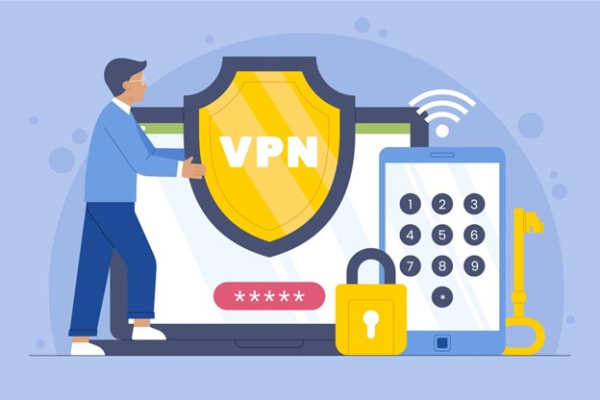How to protect your privacy on public WiFi hotspots with a VPN


Dubai, United Arab Emirates, 31st May 2024 – Using public Wi-Fi is convenient but risky, as cybercriminals often target these networks due to high user traffic and weak security. Without protection, your data and devices are vulnerable.
A VPN (Virtual Private Network) enhances your security on public Wi-Fi by encrypting your traffic and hiding your IP address, making cyberattacks much harder.
The article on VPNRanks further discusses why you should use a VPN and how it protects you on public Wi-Fi.
How to Protect Your Device on Public Wi-Fi with a VPN in 5 Steps
Follow the steps below to device on Public Wi-Fi with a VPN.
- Choose a trusted VPN provider. I recommend ExpressVPN.
- Download and Install the VPN app on your device.
- Open the app and log in using your credentials.
- Select a VPN server from the available list and connect to it.
Common Public Wi-Fi Threats That VPNs Can Prevent
VPNs improve public Wi-Fi safety, especially for activities like Crypto trading, by hiding your IP address and encrypting data. They also protect against cyber espionage, viruses, and data leaks.
Public Wi-Fi attacks often target passwords and credit card info but can also involve ransomware and viruses.
Common threats VPNs help prevent:
Malware Infection
Public Wi-Fi can expose devices to malware like spyware, trojans, and ransomware. Hackers exploit vulnerabilities to infect devices, often lying dormant until activated. Top VPNs, such as ExpressVPN, offer real-time protection by scanning and blocking malicious traffic.
Password Theft
Password theft is common due to weak passwords. Hackers use public Wi-Fi to steal passwords through espionage software or spyware. A VPN protects by encrypting traffic and blocking spyware.
Man-in-the-Middle Attacks
MitM attacks intercept communications to steal information like passwords. Public Wi-Fi is particularly vulnerable. VPNs encrypt all online traffic, making intercepted data unreadable and preventing MitM attacks.
Evil Twin Attacks
Evil Twin attacks, or Wi-Fi honeypots, involve hackers creating fake networks that appear legitimate, such as ‘Free_bus_stationWiFi.’ These networks lure users to steal information or direct them to fraudulent websites.
Ransomware Attacks
Ransomware can paralyze entire sectors by demanding a ransom to restore access. It often spreads through Man-in-the-Middle or Evil Twin attacks on public Wi-Fi.
Online Account Takeover
Hackers use public Wi-Fi to steal account credentials or redirect users to fake websites to capture login information. Online accounts are highly valuable, and hackers profit from stealing them.
Snooping or Sniffing
Public Wi-Fi networks often lack strong cybersecurity, prioritizing speed over security. Hackers take advantage of these weaknesses to deploy surveillance software.
How does a VPN protect me on public wifi?
VPNs offer numerous features for protection on public Wi-Fi. Moreover, reputable VPN developers constantly update their software to combat the latest cyber threats.
Here’s how a VPN protects you on a public Wi-Fi network:
IP Address Obfuscation
A VPN encrypts and routes your data through a secure server, hiding your original IP address and replacing it with another. This prevents IP tracking methods, as hackers can only see traffic going to the VPN server.
Encryption
VPNs add a layer of encryption to safeguard your online privacy. Even if a public Wi-Fi network is compromised and forced to use an unencrypted HTTP protocol, a VPN’s encryption ensures your data remains secure.
No-Logs Policy
A true no-logs policy distinguishes professional VPNs. Reliable VPNs do not store user activity logs, enhancing privacy by preventing anyone from inspecting or extracting valuable information.
Anti-Malware Features
Modern VPNs now include advanced cybersecurity features similar to antivirus software. These features are crucial for public Wi-Fi safety, as such networks are often exploited to deliver malware.
VPN Safety Limits on Public Wi-Fi
Here are some threats that VPNs cannot protect against:
- Unpatched Software: Without timely updates, hackers can exploit software vulnerabilities despite VPN protection.
- Brute Force Attacks: Weak passwords are vulnerable to automated hacking tools.
- Browser Fingerprinting: Advanced tracking methods can bypass VPNs. Use additional privacy tools for better protection.
- Human Error: Vigilance is essential as no software can prevent social engineering scams where hackers trick you into revealing sensitive information.
How to Choose a VPN for Public Wi-Fi Protection for the Device
Here are key factors to consider when selecting a VPN for Wi-Fi safety:
- Advanced Encryption: Use a VPN with strong encryption to protect against online espionage.
- Anti-Malware: Select a VPN with virus protection for public Wi-Fi security.
- Fast Servers: Opt for a VPN with ultra-fast servers to avoid additional lag.
- No-Logs Policy: Ensure the VPN does not store activity logs to prevent data leaks.
Using public Wi-Fi networks is fine as long as you use additional cybersecurity tools. A Virtual Private Network (VPN) is a highly effective safety measure that neutralizes several serious threats.
A VPN enhances your online privacy, detects viruses, and blocks harmful websites. It protects against MitM, Evil Twin attacks, and online espionage with advanced encryption, deterring most hackers.
Media Contact
Organization: WEBAFFINITI – FZCO
Contact Person: WEBAFFINITI – FZCO
Website: https://www.vpnranks.com/
Email: Send Email
City: Dubai
Country: United Arab Emirates
Release Id: 31052412724
